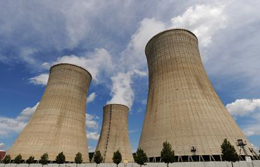Explosions in the Fukushima nuclear power plant in Japan have created active protest against nuclear energy in Western Europe and Estonian economy and coruscations minister Juhan Parts said that the Estonian government will also have to take into account the change of public opinion, LETA/National Broadcasting reports.
Building a nuclear power plant is in the election programme of the leading Reform Party, and Pro Patria and Res Publica Party (PRU) programme also prescribes corresponding studies.
“We have to take into account the public opinion and it is clear that what is seen on TV affects public opinion,” said Parts (PRU).
Non profit organisation Estonian Nuclear Power Plant CEO Kalev Kallemets (Reform Party) said that most likely the governmental and Riigikogu cannot focus on that field of energy fully this year. “Most likely thorough studies and explanation work has to be done before such a decision can be made,” he noted.
According to studies so far, there are 6 places in Estonia that are suitable for a nuclear power plant. Media has mainly focussed on the Pakri island where the state-owned energy company Eesti Energia has conducted studies too.
Estonian Nature Foundation board chairman Jüri-Ott Salm said that the most important issue is where to store nuclear waste. He added that alternatives should be weighed more thoroughly like hydro-energy and wind energy.
Kallemets responded that Estonia does not have hydro-capacity, any mountain ranges, and oil shale plants and renewable sources of energy are not economical without subsidies. “Nuclear energy is one of the alternatives but there must be clear understanding of the public of that here,” he said.
source: baltic course.com
Below is an interview video with Kimura Taketsuka, The Democratic Party of Japan, in connection to the explotions.
credit : YouJudgeThis
According to the video above, the Democratic Party of Japan, Kimura Taketsuka, does not deny for a moment that the time for major change of Nuclear resources has come.
The problems of nuclear power policy is also being much discussed at varioustelevision channels, such as: PressTV, Channel 4 News..
"Research stemming back to the 1970s shows how the risks of nuclear power are almost unique in their capacity to instil public concern. "Research stemming back to the 1970s shows how the risks of nuclear power are almost unique in their capacity to instil public concern. Worries about major accidents and radioactive waste storage, the invisible effects of radiation, and distrust brought on by the early secrecy and hubris of the nuclear industry, all combined in a lethal cocktail which very quickly served to stigmatise civilian nuclear power. One clear effect of the ensuing public pressure was a failure of the nuclear industry to expand further after the 1980s.
The past 10 years has shown a gradual reversal in fortunes for the industry. Opinion polling indicates a reduction in opposition amongst the public in Britain over that period, as compared to the very high levels of opposition reached after the last nuclear disaster at Chernobyl in 1986.
A closer look at the polling data shows a more complex picture, however, with a large proportion of recent national support being fragile -a very reluctant acceptance at best. While many in Britain have indeed come to support nuclear power over the past decade they do so while viewing it only as a "devil's bargain", a choice of last resort in the face of the severe threat of climate change. The events this week in Japan are, for many, likely to test that acceptance to breaking point.
source: previeous.presstv.ir
With the growing consensus that the nuclear accident at the Fukushima Daiichi nuclear power station has now surpassed the severity of Three Mile Island to become the world's second-worst event of this kind, the early effects on Japanese public opinion and government policy are beginning to become manifest.
NGOs and anti-nuclear groups that had once been widely dismissed are now being listened to with great interest.
Skepticism about government pronouncements is causing some people to come and seek independent assessments of the situation. Among the groups offering these assessments is Greenpeace, which has launched a major study on the impact of the Fukushima crisis.
Meanwhile, other anti-nuclear groups in Japan are engaged in street protests. This footage provided by the Japan Congress Against A- and H-Bombs demonstrates that protests that used to attract a few dozen people before the Fukushima crisis are now pulling in more than a thousand.
Certainly the ongoing nuclear crisis is having a deep effect on Japanese public opinion, but is it also going to have a major effect in the political world? Those who spoke to Press TV say, definitely yes.
NGOs and anti-nuclear groups that had once been widely dismissed are now being listened to with great interest.
Skepticism about government pronouncements is causing some people to come and seek independent assessments of the situation. Among the groups offering these assessments is Greenpeace, which has launched a major study on the impact of the Fukushima crisis.
Meanwhile, other anti-nuclear groups in Japan are engaged in street protests. This footage provided by the Japan Congress Against A- and H-Bombs demonstrates that protests that used to attract a few dozen people before the Fukushima crisis are now pulling in more than a thousand.
Certainly the ongoing nuclear crisis is having a deep effect on Japanese public opinion, but is it also going to have a major effect in the political world? Those who spoke to Press TV say, definitely yes.
source: edition.presstv.ir

Tidak ada komentar:
Posting Komentar